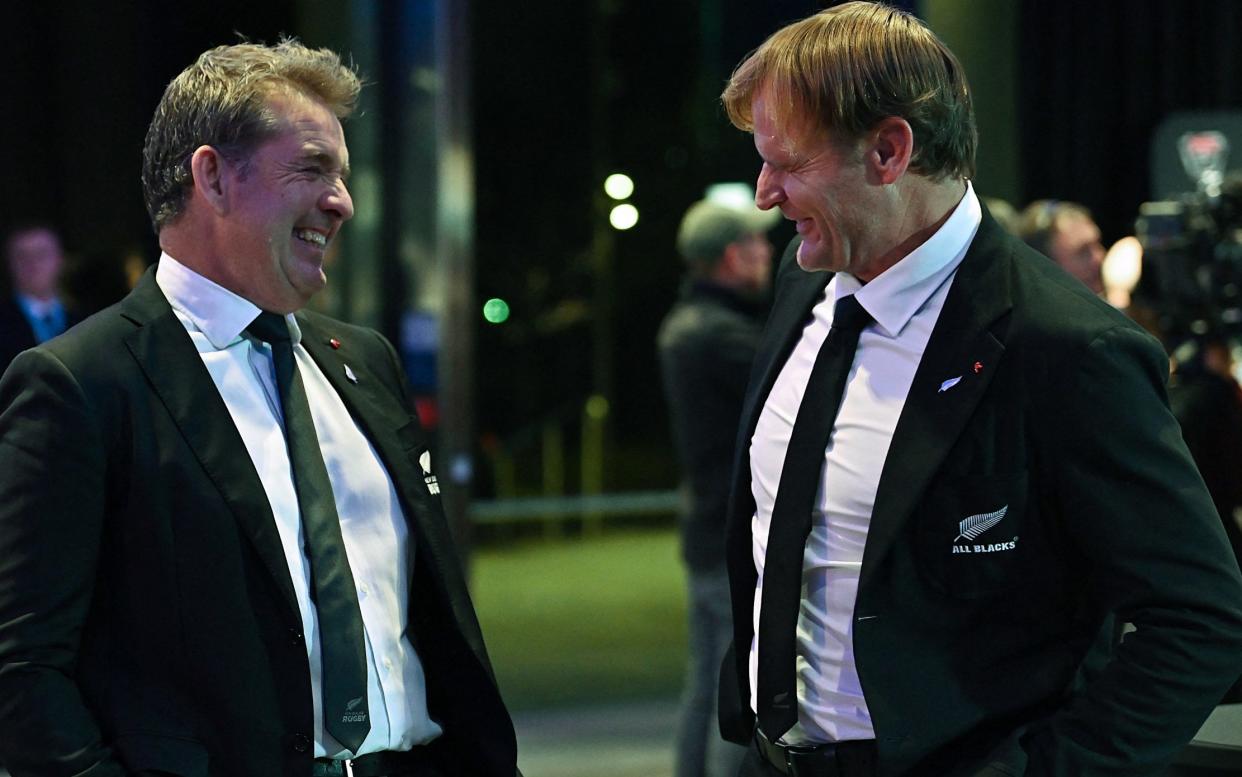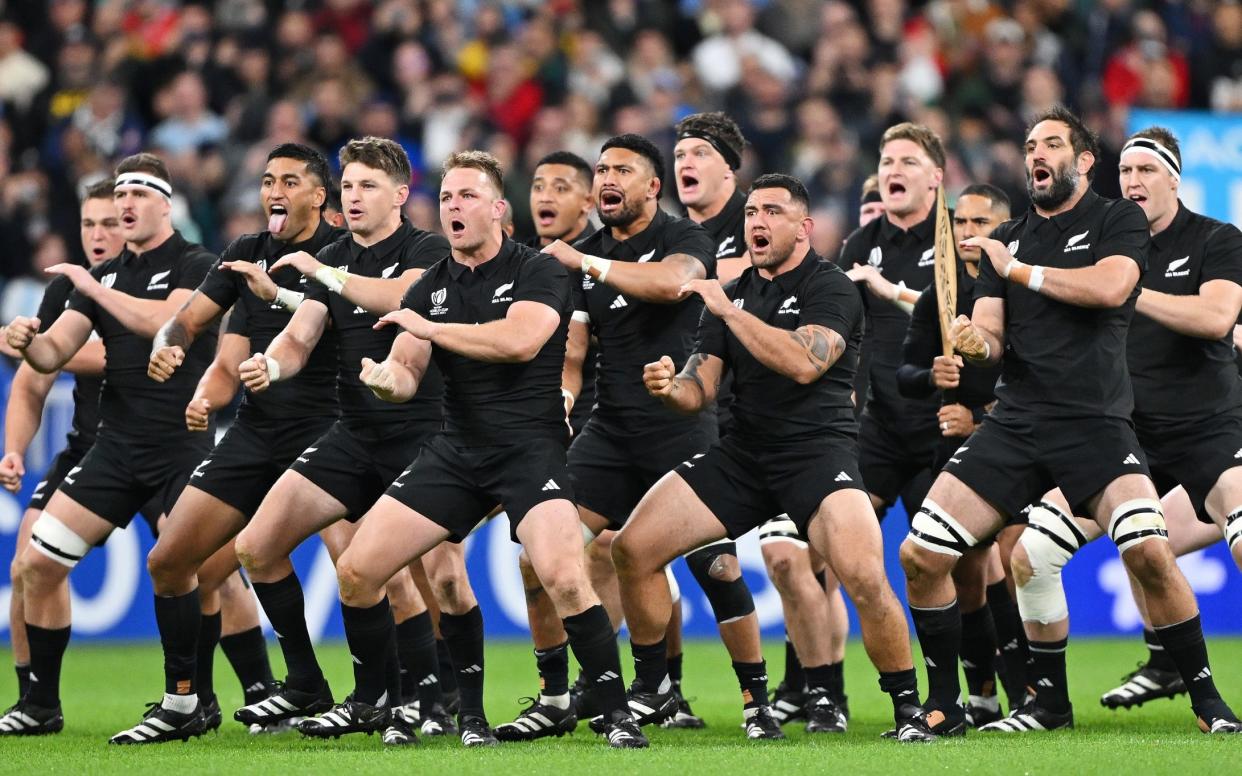
Rugby union has frequently been compared to a religion in New Zealand that permeates the entire population of five million, from the old lady pontificating on who the All Blacks’ third-choice scrum-half should be to the taxi driver giving the visiting players the inquisition on their line-out lifting strategy.
Yet there is evidence that even if society has not become fully atheist, it is at least turning agnostic. Marcus Smith looked nonplussed when asked whether he had received any verbals from Kiwis during England’s first week in Auckland. Last weekend, a good portion of England’s squad attended a New Zealand Warriors National Rugby League game unrecognised and unmolested.
Undertaking an unscientific survey of Auckland taxi drivers, none knew that the All Blacks were playing Test matches against England, although one did identify Scott Robertson as the coach “who dances”. Even a rugby-supporting Dunedin cabbie pointed out that the interest in the series was far less than that of a recent P!nk concert at the Forsyth Barr Stadium. Thursday’s sports section of the Otago Daily Times carried not a word on Saturday’s first Test, but did highlight how the general manager of Basketball Otago was stepping down from his position.
Rugby remains far bigger in the most remote part of New Zealand than anywhere in the United Kingdom. Nowhere else in the world does a sporting team define a national identity as much as the All Blacks, who are by far New Zealand’s most recognisable export (with apologies to Peter Jackson). But rugby’s hold on the national consciousness is slipping and faces myriad challenges just to stay where it is.
Here are some stats: 32,429 adults play regular rugby, nearly half the total of “soccer” while junior boys’ numbers fell two per cent below 50,000 in the 2023 season with a particularly pronounced drop in the number of schools playing. Between 2000 and 2020, there has been a 20 per cent drop in player participation at secondary schools.
At the top level, the All Blacks’ winning percentage under Ian Foster fell to 70 per cent, the lowest in their history and well below the 87 per cent enjoyed by Steve Hansen from 2012 to 2017. For the 2023 financial year, the New Zealand rugby union posted a loss of $8.9 million (about £4.26 million) following a $47 million deficit in 2022.
Then there is the civil war between the players and the provincial unions over governance reform (boring but important), the talent drain to Japan led by fly-half Richie Mo’unga, half-empty stadiums at Super Rugby Pacific and an increasing dislocation between the grass roots and professional games. Even Saturday’s match in Dunedin is not yet a sell-out.

Of course, New Zealand Rugby Union chief executive Mark Robinson is keen to put a glossier spin on things. “Inherently I am really positive about the sport,” Robinson said. “It’s been a tough few years. There’s no doubt about that. Predominantly, our country was obviously one of the most impacted [by Covid] in terms of the way that the lockdowns worked here. We understand, especially in an isolated country like ours, the public interest produces certain headlines and noises, but the reality is far different.” He points to an increase in Super Rugby viewership numbers [admittedly from a low base] and overall participation numbers, driven by an increase in the female game.
Indeed many of the challenges facing New Zealand are far from unique, from declining participation rates to the balancing of accepting pay-TV’s coin versus the greater exposure afforded by free-to-air. Yet there are other problems that are peculiar to what Robinson calls a “pretty isolated [country] at the bottom of the world”.
New Zealand society is rapidly changing. In the past couple of years there has been a huge ‘brain drain’ among younger professionals to Australia, with a record number leaving last year while immigration from Asia, which has little connection to rugby, has boomed, particularly in Auckland. This matters in a country with a smaller population than Scotland.
And tastes are changing too. Basketball has exploded in popularity (the national team is the wonderfully named ‘Tall Blacks’) while league is not just parking its tanks on union’s lawn but busily loading shells too. The Warriors franchise consistently sell out their home games at Mount Smart Stadium in Auckland, unlike the Blues, despite them winning the Super Rugby title this year.
In part this is because the much remodelled Super Rugby is a confusing mess of a competition, unlike the slick and simple NRL, which boasts the best players in the sport playing on a weekly basis. While the NRL has yet to secure the defection of a prominent All Black, it is increasingly dominating the battle for younger, particularly Polynesian, talent around Auckland. A second franchise based in the South Island is already in the works.
Robinson is not blind to these challenges. He admits the governance reform is “casting a shadow” and “we wouldn’t hold our model up as being perfect”. One approach the New Zealand Union took was selling a stake in its commercial arm to private equity giant Silver Lake for around $200 million (£95 million). To say this was controversial in New Zealand is an understatement.

“We felt across rugby in general we needed some capital in the sport and some greater capability to help drive greater revenue growth,” Robinson said. “We had been reasonably successful at that revenue growth and managed to be able to invest in the game, from retaining players to investing in the community game, but we felt we needed to continue to grow revenue.”
Some of that involves taking games abroad as international guns for hire. They will play Fiji in San Diego following this series and Japan in Tokyo before their autumn tour, but that is increasing the sense of dislocation many New Zealanders feel from the All Blacks as individuals. “Look at the inherent tension between the legacy and history versus the future and the evolution of the sport,” Robinson said. “We have 130 years of history with the All Blacks, deeply connected to this part of the country, but we know that to be able to drive more revenue and create a fanbase we need to have a footprint overseas. That’s a tension you have to work through.”
In Robinson’s view, you cannot separate the commercial from the community or All Blacks strands. “You can’t have one without the other,” he says.
Yet nearly everything flows from a successful All Blacks team. Winning cures a multitude of ills. Which places even more pressure on the shoulders of an already stressed Robertson to hit the ground running against England on Saturday and engineer a religious revival.
Article courtesy of
Source link